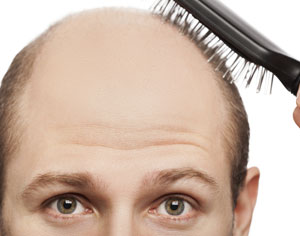Does Low Testosterone Cause Male Baldness?
Hair can actually be an indicator of a person’s health in many ways. There are different stages in life when hair growth can be affected, such as in pregnancy or menopause for women, andropause for men, or when certain medical conditions are involved. Stress also plays a role in hair growth and loss. One significant area of research focuses on testosterone and baldness.
Hormones help control nearly all functions in the human body, and distinct changing levels can affect hair and nail growth, skin, weight, muscles, bones, and many other issues. In this instance, the connection between male baldness and testosterone is being examined. Although genetics and age do play a part in hair loss, hormones, or a decrease in particular hormone production, may be a leading cause of baldness for some men.
During the time of andropause (the male version of menopause), fluctuating testosterone levels can have an adverse impact on the regeneration of hair follicles. This is most often attributed to DHT (dihydrotestosterone), a testosterone derivative that can produce oily skin, acne, increasing chest hair, and decreasing scalp hair.
How does testosterone cause baldness in this situation? DHT can impact and shrink hair follicles to the point where they regress and die by decreasing the growth cycle and increasing the resting cycle. Hair becomes shorter and finer until it stops growing altogether. This results in premature balding.
Levels of Baldness
There are different levels of baldness in men, and these may hold the key to examining the correlation between baldness and testosterone. Taking this theory a bit further, a Harvard Physician’s Health Study discovered that men who had bald spots had a higher risk of coronary artery disease than men with a full head of hair. Although frontal baldness was not associated with this risk factor, mild vertex baldness had a 23% increase, compared to a 32% risk with moderate baldness and a 36% increase with severe hair loss. An Australian prostate cancer study found the same correlation.
Since low testosterone has long been found in men with coronary artery disease, hair loss, along with other symptoms of Low T, may someday provide a warning sign of other heart and medical concerns as research continues to provide us with answers in this area.
Below is information about the varying degrees of male hair loss, as shown by the Norwood Classification system from 1975. Class I represents the adolescent hairline, and Class II signifies the adult hairline before balding is considered.
The stages of baldness are:
- Frontal recession – Class III is the earliest stage of hair loss and is characterized by deepening of temporal hair recession. This is considered frontal baldness.
- Vertex baldness– Class IV represents early stages of hair loss in the vertex area (crown). Class V continues this with bald patches in the front and crown enlarging. A hair bridge is still present, but continuing to shrink.
- Near-total baldness – Class VI brings a disconnection of the hair bridge, causing the appearance of a large bald area encompassing both the front and top of the scalp. The hair on the sides of the head remains relatively high at this point. Class VII is the final stage and is present when only a slight ring of hair remains at the sides and the back of the scalp.
The Effect of Testosterone Replacement Treatment on Hair Loss
There is a possible solution for low testosterone baldness. If the cause of hair loss is aligned with a decline in testosterone production, and not genetics, illness, stress, or other external factors, then an increase in bioavailable testosterone may have a positive effect on hair growth.
Thankfully hair follicles themselves never die off. Treatment for Low T can help to stimulate proper follicle performance and hair growth.
The theory that low testosterone causes baldness has not been proven; however, there is certainly a possible correlation for some people that Low T could contribute to their hair loss.
In order to determine if testosterone therapy can help reverse hair loss, a hormone replacement therapy specialist will run blood tests to determine if a decline in testosterone production is present and if any other health issues may be contributing to this situation. This will enable the doctor to determine if treatment with testosterone replacement can bring beneficial results.
For those whose hair loss may be attributed to changing hormone levels, possible regrowth and thickening of hair may become a reality.
The medical staff at National HRT can provide testing, support, and treatment for men who are concerned that low testosterone levels may be contributing to premature balding and other symptoms. Complimentary consultations by phone are always available during regular business hours.
- The Relationship between Testosterone Deficiency and Men’s Health Akira Tsujimura World J Mens Health. 2013 Aug; 31(2): 126–135. Published online 2013 Aug 31.
- Everyday Health
- Men`s Health
- Medical News Bulletin
- DR Yates, MD
- Harward Medical School
- Hormonal profile of men with premature balding. Stárka L1, Cermáková I, Dusková M, Hill M, Dolezal M, Polácek V. Exp Clin Endocrinol Diabetes. 2004 Jan;112(1):24-8.
- The Guardian
- Wikipedia
- BodyLogycMD
- MedicineNet
- The effects of hair loss in European men: a survey in four countries.Budd D, Himmelberger D, Rhodes T, Cash TE, Girman CJ.Eur J Dermatol. 2000 Mar;10(2):122-7.
- National Library of Medicine
- MAYO CLINIC




I'm wondering if low T could be associated with conversion to DHT by reductase (?). I wonder if TRT and DHT inhibitors like Finasteride and Dutasteride are compatible, or even synergistic - if testosterone isn't being converted to DNT, then there will more of it. However, if testosterone is elevated or replaces that converted to DHT, could TRT then cause increased DHT by providing more testosterone raw material to be converted?